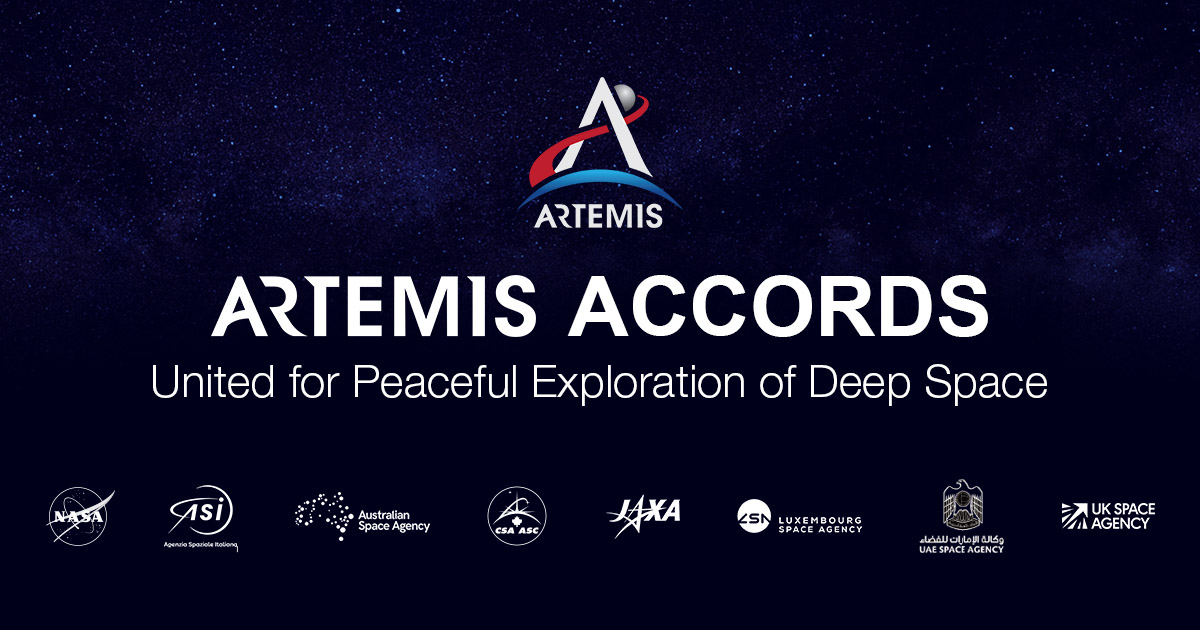International cooperation on and around the Moon as part of the Artemis program is taking a step forward today with the signing of the Artemis Accords between NASA and several partner countries. The Artemis Accords establish a practical set of principles to guide space exploration cooperation among nations participating in the agency’s 21st century lunar exploration plans.
“Artemis will be the broadest and most diverse international human space exploration program in history, and the Artemis Accords are the vehicle that will establish this singular global coalition,” said NASA Administrator Jim Bridenstine. “With today’s signing, we are uniting with our partners to explore the Moon and are establishing vital principles that will create a safe, peaceful, and prosperous future in space for all of humanity to enjoy.”
While NASA is leading the Artemis program, which includes sending the first woman and next man to the surface of the Moon in 2024, international partnerships will play a key role in achieving a sustainable and robust presence on the Moon later this decade while preparing to conduct a historic human mission to Mars.
The founding member nations that have signed the Artemis Accords, in alphabetical order, are:
- Australia
- Canada
- Italy
- Japan
- Luxembourg
- United Arab Emirates
- United Kingdom
- United States of America
NASA announced it was establishing the Artemis Accords earlier this year to guide future cooperative activities, to be implemented through bilateral agreements that will describe responsibilities and other legal provisions. The partners will ensure their activities comply with the accords in carrying out future cooperation. International cooperation on Artemis is intended not only to bolster space exploration but to enhance peaceful relationships among nations.
“Fundamentally, the Artemis Accords will help to avoid conflict in space and on Earth by strengthening mutual understanding and reducing misperceptions. Transparency, public registration, deconflicting operations – these are the principles that will preserve peace,” said Mike Gold, NASA acting associate administrator for international and interagency relations. “The Artemis journey is to the Moon, but the destination of the Accords is a peaceful and prosperous future.”
The Artemis Accords reinforce and implement the 1967 Treaty on Principles Governing the Activities of States in the Exploration and Use of Outer Space, Including the Moon and Other Celestial Bodies, otherwise known as the Outer Space Treaty. They also reinforce the commitment by the U.S. and partner nations to the Registration Convention, the Agreement on the Rescue of Astronauts, and other norms of behavior that NASA and its partners have supported, including the public release of scientific data.
The principles of the Artemis Accords are:
- Peaceful Exploration: All activities conducted under the Artemis program must be for peaceful purposes
- Transparency: Artemis Accords signatories will conduct their activities in a transparent fashion to avoid confusion and conflicts
- Interoperability: Nations participating in the Artemis program will strive to support interoperable systems to enhance safety and sustainability
- Emergency Assistance: Artemis Accords signatories commit to rendering assistance to personnel in distress
- Registration of Space Objects: Any nation participating in Artemis must be a signatory to the Registration Convention or become a signatory with alacrity
- Release of Scientific Data: Artemis Accords signatories commit to the public release of scientific information, allowing the whole world to join us on the Artemis journey
- Preserving Heritage: Artemis Accords signatories commit to preserving outer space heritage
- Space Resources: Extracting and utilizing space resources is key to safe and sustainable exploration and the Artemis Accords signatories affirm that such activities should be conducted in compliance with the Outer Space Treaty
- Deconfliction of Activities: The Artemis Accords nations commit to preventing harmful interference and supporting the principle of due regard, as required by the Outer Space Treaty
- Orbital Debris: Artemis Accords countries commit to planning for the safe disposal of debris
Additional countries will join the Artemis Accords in the months and years ahead, as NASA continues to work with its international partners to establish a safe, peaceful, and prosperous future in space. Working with emerging space agencies, as well as existing partners and well-established space agencies, will add new energy and capabilities to ensure the entire world can benefit from the Artemis journey of exploration and discovery.
Learn more about NASA’s Artemis program at:
-end-
Sean Potter / Cheryl Warner
Headquarters, Washington
202-358-1536 / 202-358-2975
sean.potter@nasa.gov / cheryl.m.warner@nasa.gov

























